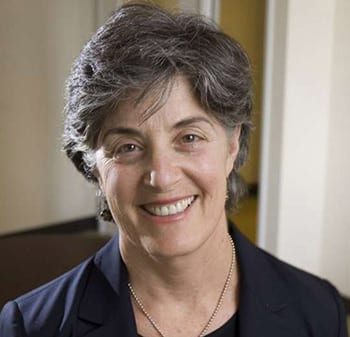By Andrew Cohen

Berkeley Law graduate Jane Kahn ’83, a prominent civil rights lawyer and leading advocate for prisoners’ rights in California, died of brain cancer at home with her family on December 26, 2018. She was 64.
“She was a powerful leader in humanizing clients and helping people understand the severity of their suffering and the enormity of their conditions,” says Michael Bien, her husband and fellow partner at Rosen Bien Galvan & Grunfeld in San Francisco.
Kahn played a vital role in two 1990s court rulings which held that California prisons provided inadequate mental health care to inmates and violated the Americans with Disabilities Act. The rulings also mandated that the state make substantive reforms.
In Armstrong v Davis, a class of prisoners and parolees claimed that prison officials deprived them of ADA-required accommodations. A federal district court agreed, ordered the state to produce a new remedial plan, and later entered a permanent injunction directing the plan’s enforcement.
Coleman v. Wilson tasked California with improving prisoner screening, treatment programs, staffing, records, medication distribution, and suicide prevention. The court found that prison officials illegally deprived inmates of certain medication, violated the Constitution by harshly punishing mentally ill prisoners for misconduct, and used Tasers without considering their mental health condition.
“Jane’s life taught us all that we need to keep fighting against the inhumanity that society too often inflicts on those who are particularly vulnerable, and that we do so with compassion for the individuals we represent,” says Don Specter, longtime executive director of the Prison Law Office.
Kahn worked with Specter from 1990 to 1997 as a staff attorney at the PLO, a nonprofit firm that strives to ensure the humane treatment of prisoners. Its two-year fellowship program for new lawyers has been renamed in her honor.
Supreme Court triumph
In 2011, a suit in which Kahn was closely involved led to a U.S. Supreme Court ruling that California’s prison overcrowding violated constitutional protections against cruel and unusual punishment. The court ordered the state to reduce its prison population by 33,000 over two years.
“Jane fought for the right to bring cameras into prisons to show the conditions,” Bien says. “That had never really happened before, and it made a big difference. The prison overcrowding case is one of the only Supreme Court decisions with a photo attached to it. We talk about figures and overcrowding percentages, which are important, but Jane brought out the individual stories that humanized our clients.”
Kahn reviewed extensive suicide files, poring over medical records and often finding avoidable prison system missteps that gave her nightmares. She meticulously reviewed videos used in litigation that showed various forms of jarring prisoner abuse, selecting the most powerful frames and images.
Consulting with mental health experts to better understand the toll of prisoner advocacy, Kahn wrote a seminal article on secondary trauma and spoke about it at conferences. She also established a support mechanism at her firm to help lawyers and others engaged in prisoners’ rights work.
“The natural reaction is to think clients have it worse and I shouldn’t complain,” Bien says. “The problem there is people get burned out and leave. You can’t do this work for an extended period without acknowledging and addressing the effects it has. Jane made a significant contribution in helping people sustain their important work in this area.”
Born in St. Louis, Kahn graduated from Brandeis College and earned a Master’s in sociology from Northwestern before law school. Her time at Berkeley Law included an externship with iconic federal judge Thelton Henderson ’62.
“Jane spoiled me,” Henderson says. “She was an extern during my first year as a judge and did a superb job. I thought all externs would be like that. Before long, we started giving her more substantive assignments, and she was more like a third law clerk than an extern. Jane was so likable and totally committed to serving the public interest.”
Mentor and role model
Kahn also mentored many lawyers such as Hugo Cabrera ’15, who met her in 2010 as a paralegal at Rosen Bien Galvan & Grunfeld, and rejoined the firm last year as an associate attorney.
“Jane inspired everyone she worked with and was loved and respected by all,” Cabrera says. “She was tremendously compassionate, a great listener, and very well-regarded by our clients … because she’d do her very best to connect with them.”
Kahn trained the firm’s paralegals and lawyers to respond personally to each of the hundreds of letters they received from prisoners. Cabrera says that has allowed the firm’s lawyers to keep close tabs on their clients’ lives and help reduce suicide and suffering.
Specter says Kahn’s “passion and devotion to helping these unfortunate individuals was always on display, especially when she was arguing with prison officials.”
Kahn was a founding board member of the Prison University Project, which offers higher education classes to San Quentin Prison inamtes. She advocated extensively for the homeless and worked with Hamilton Families, a nonprofit that tackles family homelessness in the Bay Area. Kahn and her law firm have also been regular supporters of Berkeley Law’s Death Penalty Clinic.
In addition to Bien, Kahn is survived by her brother, two sisters, three sons, and two daughters-in-law. In lieu of flowers, the family requests a donation to Prison University Project, Hamilton Families, or another charity.
“Jane had a huge impact on the lives of so many people,” Cabrera says. “Her legacy of helping prisoners and inspiring others to do prison work will live on for a very long time.”